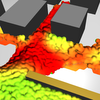Fluid simulation tools are capable of predicting natural processes and may be employed for the assistance in the human decision making process. Existing solutions lack a number of important features needed for a feasible support system. Very important is the usability of the simulation tools by non-experts in real-time without special fluid simulation expertise. More research is thus needed which fully exploits modern visualization, steering and simulation technologies. Especially, with the capabilities of graphics hardware clusters, everybody will have access to affordable supercomputing power on their desktop. Until now, little work has been done to use this power for interactive simulation for knowledge generation. In this proposal we suggest a novel, integrated system that operates in real-time and provides effective feedback via an intuitive web-based interface. The proposed technique enables users to interact with a remote simulation system based on their understanding and to examine alternative scenarios in a short period of time. Among the application areas of the suggested system we consider the industrial design of components where rapid prototyping is required. Using a less accurate but fast and intuitive system will help to evaluate whether a certain concept is promising during the design phase. Another important application will be the assistance in emergency situations that are caused by natural disasters such as floods, where safety and damage limitation depend on fast decisions. Our vision is that, even under time-critical circumstances, emergency personel on-site will be able to analyze the imminent situation quickly to finally choose the best response strategy. Consider a flooding situtation, where helpers are trying to prevent danage by arranging flow barriers in different locations. Using a mobile device like a hand-held tablet pc, the helpers are capable to quickly setup and perform a simulation. Interactive 3d renderings and 2d sketches of the local area illustrate the simulation outcome and show the flooding risks. Assuming that later, the weather conditions change unexpectedly, quick responses are necessary. By means of intuitive drawing with a control pen, users rearrange the barriers and start an additional simulation. In such an interactive cycle, helpers are able to quickly optimize the arrangement of the barriers.
To realize our vision we plan the integration and extension of methods from multivariate visualization, computational steering and physical simulation. This combination evolves into a new paradigm we call semantic steering: Users will be able to steer simulations based on their knowledge and understanding. We suggest to move from a direct manipulation of numbers towards interaction with advanced visual controls. No more complicated rethinking, users simply sketch their ideas. Visual analytics will be crucial for the success of the project. Visualization is a natural way to get insight into the complex simulation outcome and to understand the relevance of decisions made. Novel techniques are required as users will be confronted with a whole range of simulation runs. To develop and show the feasibilty of our concepts we will incorporate existing simulation solutions that are implemented on graphics hardware and provide a good tradeoff between accuracy and speed. New data structures and algorithms for scalable visualization, interaction, analytics and data-handling are necessary and we have compiled a team of senior and junior scientists with experience in both scientific research and industrial applications to solve the involved questions.
Funding
- FWF P 22542-N23
Publications
2 Publications found:
Download list as Bibtex, HTML (Advanced, Expert), JSON (with referenced objects), CSV, Permalink
| Image | Bib Reference | Publication Type |
|---|---|---|
| 2010 | ||
 |
Jürgen Waser, Raphael Fuchs, Hrvoje Ribičić, Benjamin Schindler, Günter Blöschl, Eduard Gröller World Lines IEEE Transactions on visualization and Computer Graphics, 16(6):1458-1467, November 2010. [  Paper] Paper] |
Journal Paper (without talk) |
 |
Hrvoje Ribičić COMPARATIVE RENDERING OF SIMULATION SCENARIOS [  Thesis] Thesis] |
Master Thesis |